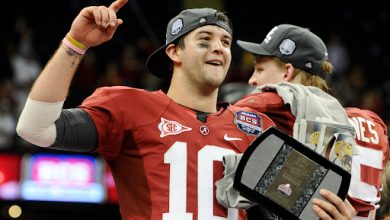Arch Manning in new career venture with Texas QB tipped for $6.5m in NIL cash

Arch Manning’s New Career Venture with Texas QB Tipped for $6.5M in NIL Cash: What This Means for College Football’s Future
Arch Manning, the highly-touted quarterback prospect from New Orleans, has been one of the most closely followed figures in college football since his early high school days. As the nephew of legendary NFL quarterbacks Peyton and Eli Manning, Arch entered the national spotlight with high expectations. Now, as he embarks on his college football journey at the University of Texas, his career is about to take on a new and exciting dimension with a career venture unlike any other—one that intertwines his football future with the rapidly evolving world of Name, Image, and Likeness (NIL) deals. With reports tipping him to earn a staggering $6.5 million in NIL compensation, Arch Manning’s entry into college football is already setting a new precedent for what is possible for athletes in the NIL era.
This article will take an in-depth look at Arch Manning’s career venture with Texas, explore how NIL deals have transformed the landscape of college athletics, and consider the long-term implications of this new reality for student-athletes, universities, and college football at large. With his impressive lineage, on-field talent, and burgeoning NIL opportunities, Arch Manning is positioned to become one of the most financially lucrative and high-profile college athletes in recent history.
The Manning Legacy: A Weighty Last Name
Before delving into the specifics of Arch Manning’s college career, it’s crucial to understand the context in which he enters college football. Arch Manning is not just another five-star recruit; he is the latest in a legendary family of quarterbacks. His uncles, Peyton Manning and Eli Manning, are two of the most accomplished quarterbacks in NFL history. Peyton, a two-time Super Bowl champion and five-time NFL MVP, has become a household name, while Eli, a two-time Super Bowl MVP, helped lead the New York Giants to victory in two historic upsets over the New England Patriots. Their success on the football field set a high bar for Arch, who entered high school as one of the most talked-about athletes in the country.
Arch Manning’s family lineage is more than just a footnote to his career; it is part of what makes his journey to college football so compelling. As the grandson of Archie Manning, a former NFL quarterback, and the son of Cooper Manning, Arch was raised in a football-centric environment. This legacy has brought significant attention to Arch since his first days on the football field, and with it, a great deal of expectation.
However, Arch is not simply riding the coattails of his famous family. He has the talent to back up the hype. As a high school quarterback at Isidore Newman School in New Orleans, Arch displayed elite skills that quickly earned him the title of the top recruit in the 2023 class. With a strong arm, exceptional football IQ, and a poised demeanor, Arch had the look of a future NFL quarterback. His ability to thrive under pressure, combined with his leadership and performance in key games, solidified his position as one of the most sought-after recruits in the country.
A New Era of College Football: NIL and Its Impact
The landscape of college athletics has changed dramatically in recent years, thanks to the introduction of Name, Image, and Likeness (NIL) rights for athletes. Prior to the NIL era, college athletes were prohibited from profiting from their athletic prowess, outside of their scholarships. However, in 2021, the NCAA officially allowed athletes to monetize their name, image, and likeness through sponsorships, endorsements, and other financial opportunities. This change has been transformative, giving athletes the ability to secure compensation for their personal brands.
The introduction of NIL deals has created a new reality for college athletes, particularly those in high-profile sports like football and basketball. Athletes who have a large following on social media, are highly visible in their respective sports, or have a significant fan base are now in a position to earn substantial amounts of money through NIL agreements. In many ways, Arch Manning’s college career is being launched in the perfect storm: a quarterback with immense talent and a legendary last name, at a time when NIL is allowing athletes to capitalize on their brand in ways that were previously unimaginable.
For Arch, the NIL landscape means that he is in a prime position to earn money while still playing at the collegiate level. According to reports, Arch is tipped to earn an eye-popping $6.5 million in NIL deals during his time at Texas. This is an unprecedented figure for a college athlete, particularly for someone who has not yet played a down of college football.
Texas Longhorns and Arch Manning: A Perfect Match
Arch Manning’s decision to commit to the University of Texas was a significant one, not only for his career but also for the future of the Longhorns’ football program. The Texas Longhorns have been one of the most successful and storied programs in college football history, but they’ve struggled in recent years to regain their former dominance. The addition of Arch Manning to the roster is expected to give the Longhorns a massive boost, not just in terms of on-field performance but also in terms of recruiting and national visibility.
Manning’s commitment to Texas also represents a shift in the college football landscape. The Longhorns are one of the premier programs in the nation, and Arch’s decision to play for them shows the lasting appeal of traditional powerhouse programs, even in the NIL era. However, the combination of Texas’ tradition and the opportunities offered by NIL has made the Longhorns a particularly appealing destination for Arch and other recruits.
In addition to Texas’ football legacy, the university is strategically located in a major media market, which is essential for any player hoping to maximize their NIL potential. Austin, Texas, is one of the most vibrant and growing cities in the United States, providing the ideal backdrop for Arch Manning to build his personal brand. The Longhorns’ position in the Big 12 Conference also adds to the appeal, as the program has the chance to compete on a national stage, garnering attention from fans and media outlets alike.
NIL Deals and the Future of College Football
Arch Manning’s career venture with Texas, combined with his expected $6.5 million in NIL deals, underscores a fundamental shift in how college football recruits and athletes will approach their careers. For the first time in history, top athletes have the opportunity to earn substantial financial rewards while still competing at the collegiate level. This represents a new era of college football, where the line between amateur and professional athletics is becoming increasingly blurred.
While some critics have expressed concern over the potential for NIL deals to create a “pay-for-play” system or for it to skew recruitment in favor of the highest bidders, there is no denying the benefits it brings to student-athletes. For players like Arch Manning, NIL provides financial security, the chance to capitalize on their fame, and the ability to build a personal brand that can last well beyond their college years. It also allows athletes to take advantage of lucrative opportunities that were previously unavailable, such as endorsement deals, social media collaborations, and business ventures.
For Texas, securing Arch Manning as a recruit is a major victory not just on the field but also off it. The sheer attention and media coverage that Arch brings to the Longhorns is invaluable, as it elevates the program’s visibility and can potentially attract more high-caliber recruits. Arch’s NIL success also highlights the broader impact that the new landscape has on college football. It’s no longer just about athletic performance; it’s about branding, marketability, and maximizing every opportunity available.
The Long-Term Implications of NIL Deals
Arch Manning’s NIL deal is a sign of what the future of college football could look like. With more athletes entering the college ranks with established social media followings and personal brands, it is possible that NIL deals will continue to increase in value. As universities and athletic departments become more adept at navigating the complexities of NIL, the opportunities for student-athletes will likely expand.
This new reality will also have an impact on the recruiting process. Coaches will not only have to consider a player’s athletic ability but also their potential marketability. The rise of NIL deals could lead to a more business-oriented approach to recruiting, where financial incentives become an integral part of a player’s decision-making process. While it’s difficult to predict exactly how the landscape will evolve, one thing is clear: the power dynamics in college football are changing, and players like Arch Manning are at the forefront of this new era.









